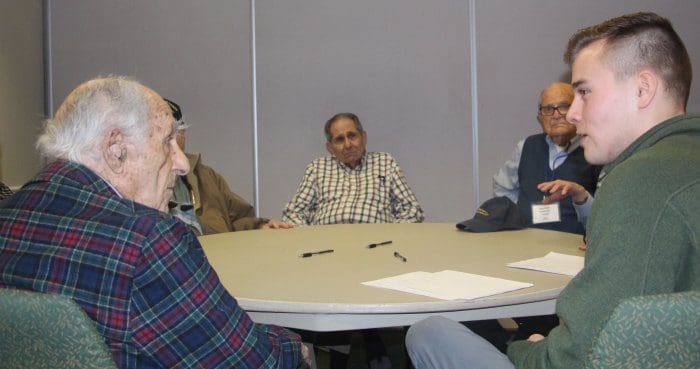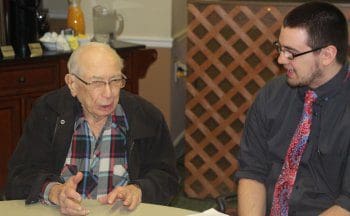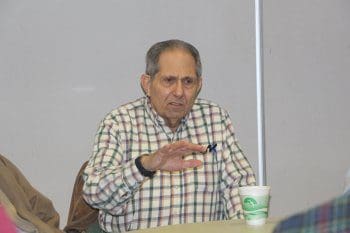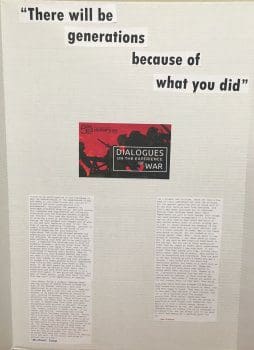Dialogues on War Connects College Students and Older Adults through Storytelling

They take turns telling their stories. Working clockwise around the table they each recount their own personal tale of when and how the war started for them.
“I graduated high school in ’42 and couldn’t wait to go in,” remembers one volunteer.
“August of 1942 is when I got my start,” says another.
“I went in December of 1950—the Korean War,” explains one veteran who was drafted into the service.

A total of seven St. John’s residents recently sat down to share their accounts in a group setting as part of new program called Dialogues on War. The moderators for this particular discussion were Michael Lang and Sam Kindron—history students at St. John Fisher College (now University). “These stories are so important for us to remember and understand,” says Lang as he explains the concept of the program to the men. “That’s really why we are doing this. To get a dialogue going and keep our collective memory strong.”
Dr. Carolyn Vacca is the chair of the History Department at St. John Fisher. She co-authored the grant for Dialogues on War, which was awarded funding through the National Endowment of the Humanities (NEH).She explains that the program is meant to give each veteran a forum to deliver their own personal accounts of service while providing students—some of whom who are veterans themselves—an opportunity to lead the discussion and absorb the perspectives of men and women who were intimately involved in the war effort throughout the 20th century. “We wanted to bring together intergenerational discussions about the ideas of war,” says Dr. Vacca, who also serves as the Monroe County Historian. “The idea is to spark discussions about the past—when young people could be drafted into service—and compare that to today where we have an all-volunteer force.”
Harold Schwartz was drafted and assigned to the U.S. Army on October 5, 1944. He was immediately sent to basic training, followed by special training in heavy weaponry. “After the Battle of the Bulge we had lost a great number of people and I was a replacement,” Schwartz says as he looks back on his journey from New York City to the European Theater as an 18-year-old. In early 1945, he crossed the Atlantic and joined Patton’s 3rd Army as part of a machine gun squad moving east across Germany. His unit marched through Mainz, Frankfurt, and Wolfsburg, witnessing firsthand the destruction these cities suffered as a result of allied bombings. Conversely, Schwartz remembers being on the receiving end of the formidable German air force in the form of nightly “Bedtime Charley” Luftwaffe raids. “I recall very vividly when they would come down in the evening and try to strafe us with their guns.”
 Like many American soldiers who survived the war, Schwartz returned to the states and utilized a new government program to fund his college education. The G.I. Bill covered the cost of his bachelor’s and master’s degrees. Schwartz enjoyed a long career as a clinical and school psychologist and even taught psychology at many Rochester area colleges, including St. John Fisher. He was glad to be a part of the Dialogues on War session held at St. John’s Meadows—the retirement community he has called home for several years. “I enjoyed relaying stories. All of us who have been in the service have a story to tell.” He believes this unique experience was mutually beneficial. “The two students seemed very interested. I think they got something out of it. I hope they did.”
Like many American soldiers who survived the war, Schwartz returned to the states and utilized a new government program to fund his college education. The G.I. Bill covered the cost of his bachelor’s and master’s degrees. Schwartz enjoyed a long career as a clinical and school psychologist and even taught psychology at many Rochester area colleges, including St. John Fisher. He was glad to be a part of the Dialogues on War session held at St. John’s Meadows—the retirement community he has called home for several years. “I enjoyed relaying stories. All of us who have been in the service have a story to tell.” He believes this unique experience was mutually beneficial. “The two students seemed very interested. I think they got something out of it. I hope they did.”
Brickstone by St. John’s resident Larry Nazarian echoes Schwartz’s sentiments. “Very, very interesting,” says Nazarian, who shared accounts of his uncle’s time in Italy during World War II as well as his own experience in a later conflict. “I enjoyed hearing the other guys.”
Nazarian feels that his wartime story brought a different perspective when compared to others heard on the day. “I went in in 1967 when the Vietnam War was getting really hot.” As a physician specializing in pediatrics, Nazarian’s orders were to remain stateside at an Army hospital. Tasked with caring for the families of soldiers fighting in Southeast Asia, he believes his service is an example of how much support there was for those serving on the frontlines. He says when soldiers returned home to the U.S. they often expressed gratitude to those looking after their families living on the base while they were overseas. “I was proud of the time I spent in service,” Larry added.

Lin Hooper is also proud of his experience. He volunteered soon after the Japanese attack on Pearl Harbor and then found himself in Florida as an expert in aerial communications. He would train countless men to repair communications equipment throughout the war. Archie Messenger volunteered for the Navy Air Corps and became an accomplished pilot and squadron leader in Okinawa. Milton Lederman was an expert in language who was sent by the Army to Cornell University, where he was forced to live in a fraternity house and learn Russian. He later discovered that he was chosen to become fluent in the language while plans were being formulated for a joint assault on Japan by United States and Soviet forces. Of course the Japanese surrendered in August of 1945, thus ending the war for all three men. Each were given time to communicate what they experienced during a period of time that would help shape the rest of their lives.
Dr. Vacca hopes that this first wave of nearly 50 Dialogues on Warsessions—two of which were hosted by St. John’s—is just the start of a sustainable program that can connect generations for years to come. She adds that sessions tend to progress from veterans sharing their own individual narratives to becoming group conversations on the same topics students learn about in class. True to form, the session at St. John’s evolved into to a discussion that included opinions and insights on how war has changed over time, the growth of the military-industrial complex, and a lively debate about whether or not America should remain the world’s policeman. That is exactly what Dr. Vacca hoped would happen when she envisioned the program. “The students have been really impressed with how well the discussions have gone,” she says. “It has been a wonderful, positive experience for them.”
